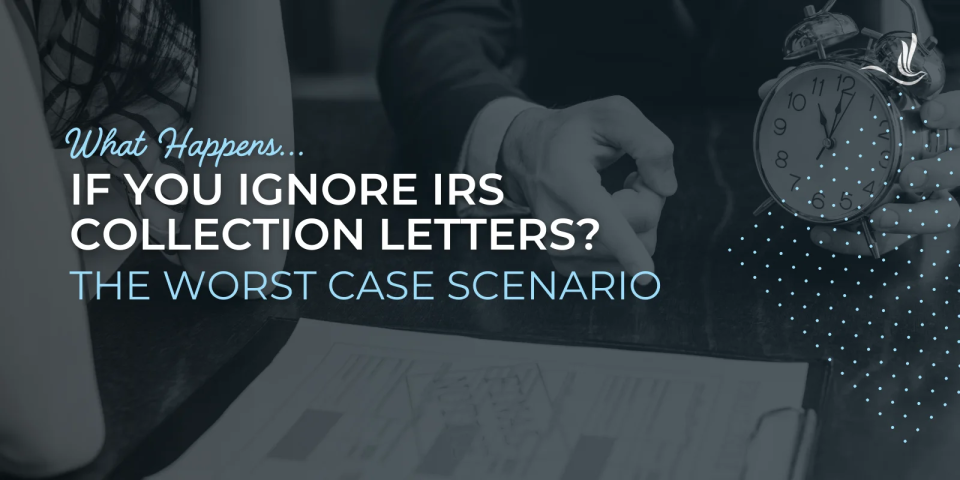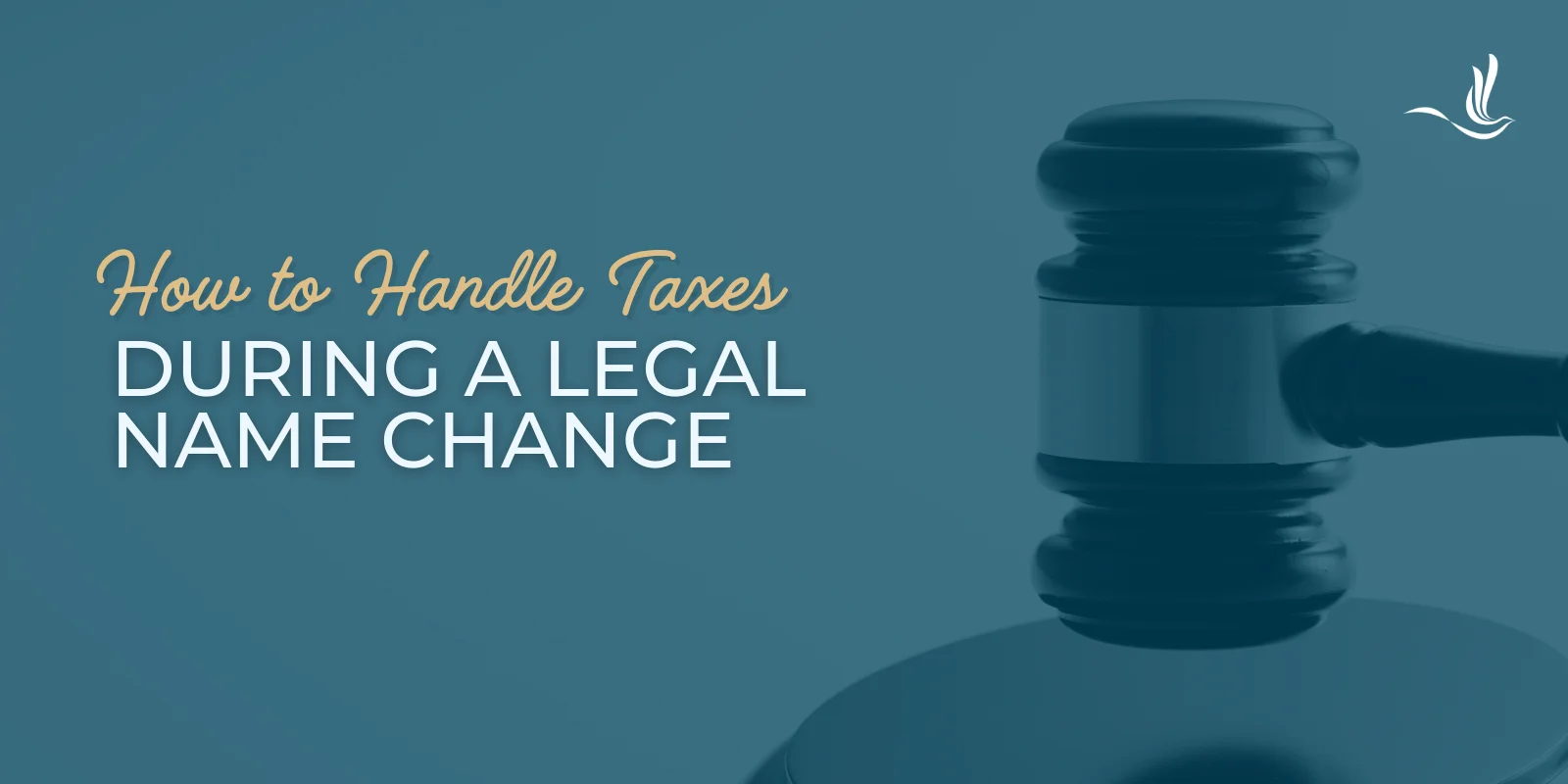Key Takeaways
Ignoring IRS letters will not make your tax problem go away; it triggers escalating collection actions and financial penalties.
The IRS can file tax liens that damage your credit and make it harder to sell or refinance property.
Continued nonresponse may lead to wage garnishment or bank levies, allowing the IRS to take money directly from your paycheck or accounts.
In severe cases, the IRS can seize assets such as real estate, vehicles, or business equipment to satisfy unpaid tax debts.
Interest and penalties continue to grow daily, meaning small tax balances can quickly become large debts.
Asking “can I ignore the IRS” is the wrong question; taking prompt action and responding to notices is the only way to avoid liens, levies, and legal consequences.
If you’ve ever asked yourself, “can I ignore the IRS?”, you’re not alone. Many taxpayers feel overwhelmed by notices from the IRS and hope that ignoring them will make the problem disappear. Unfortunately, the reality is far more serious. Ignoring IRS collection letters can trigger a series of escalating actions, from mounting penalties to wage garnishment, property liens, and even potential legal consequences. This article explores the worst-case scenarios for ignoring IRS notices and provides a clear understanding of how the IRS collects unpaid taxes.
Understanding IRS Collection Letters
When you receive correspondence from the IRS, it is crucial to recognize what type of notice it is and what it demands. IRS letters and notices are official communications about your tax account, ranging from simple reminders to urgent final notices before enforcement actions.
Ignoring these letters can be disastrous, as each notice is part of a structured collection process designed to encourage compliance and collect unpaid taxes. The question “can I ignore the IRS?” often arises when taxpayers feel intimidated or unsure how to respond, but understanding the types of IRS letters is the first step toward addressing the problem.
Common IRS Collection Notices and What They Mean
The IRS sends a variety of letters to communicate unpaid balances or discrepancies. Some of the most common include:
CP14 Notice (Balance Due Notice): This is the initial notice informing you of a tax balance. It typically comes shortly after your tax return is processed. Ignoring this notice begins the clock on interest and penalties.
CP501 and CP503 Notices (Follow-Up Notices): These letters remind you that the balance remains unpaid. Multiple notices indicate the IRS is escalating collection efforts.
CP504 Notice (Final Notice of Intent to Levy): This is a serious warning. If ignored, the IRS can move forward with levies on your property or income.
LT11 (Notice of Intent to Levy and Your Right to a Hearing): A formal final notice that gives you a short window to act before property is seized.
Not all notices demand immediate action, but ignoring ones marked as “Final Notice” or “Intent to Levy” can trigger severe consequences.
What Happens If You Ignore IRS Letters? Step-by-Step Escalation
The IRS has a methodical approach to collecting unpaid taxes. Ignoring letters does not stop the process; it accelerates it. Here is how the escalation typically unfolds.
Interest and Penalties Start Accruing
Even if your tax debt seems small, the IRS will add interest and penalties the moment you miss a payment. Interest is calculated daily on the unpaid balance and compounds monthly, while penalties can include:
Failure-to-File Penalty: 5% of the unpaid tax for each month your return is late, up to 25%.
Failure-to-Pay Penalty: 0.5% of the unpaid tax per month, up to 25%.
For example, if you owe $5,000 and ignore your IRS notice for a year, you could accrue hundreds of dollars in interest and penalties each month. Within a year, your $5,000 debt could easily exceed $6,500.
IRS Sends Multiple Follow-Up Notices
After initial letters, the IRS will continue to send reminders. Common follow-ups include CP501, CP503, and CP504. Each notice often becomes progressively firmer in tone, emphasizing that ignoring the balance will lead to enforced collection.
These notices also make it clear that ignoring the IRS does not erase your debt; in fact, it signals noncompliance and may accelerate collection action.
The IRS May File a Federal Tax Lien
When unpaid taxes go unresolved, the IRS can file a federal tax lien. A lien is a legal claim against your property, including real estate, vehicles, and business assets, ensuring that the IRS has priority over other creditors.
Implications of a tax lien include:
Makes it difficult to sell or refinance property.
Remains on public record, affecting your ability to secure loans.
Let’s look at an example. John owed $12,000 in unpaid taxes and ignored multiple IRS notices. The IRS filed a lien on his home, which prevented him from refinancing his mortgage.
The IRS Can Levy Your Wages and Bank Accounts
If a lien does not compel payment, the IRS can escalate to levies, which allow them to seize your income or bank accounts directly. Wage garnishment is one of the most common forms of IRS enforcement, and it can severely impact your ability to cover essential expenses. The IRS can also issue bank levies, freezing and withdrawing funds from your checking or savings accounts without prior notice. This can leave taxpayers suddenly unable to pay bills or access money for daily needs.
For example, Maria ignored her IRS notices for six months. Her paycheck was garnished, and her bank account was frozen, creating financial hardship and late fees for utilities and rent.
Tax Refunds Will Be Seized
Another way the IRS enforces collection is through offsetting future tax refunds. If you are owed a federal or state refund, the IRS can apply it directly to your outstanding balance.
Even if you diligently filed your next year’s taxes, your refund could be reduced to zero to satisfy prior debt if you ignored the IRS.
Seizure of Assets and Property
For persistent noncompliance, the IRS has the authority to seize physical property, including:
Real estate (homes, land)
Business assets or equipment
Personal property such as jewelry or art
Though less common than wage garnishment, property seizure is a severe consequence for ignoring the IRS and demonstrates that asking, “can I ignore the IRS?” is extremely risky.
Potential for Legal Action or Criminal Referral
Continued failure to address tax obligations can cross into criminal territory. While the majority of IRS enforcement is civil, cases involving willful neglect, fraud, or tax evasion can result in:
Fines up to $100,000 ($500,000 for corporations)
Imprisonment for tax evasion or fraud
Ignoring the IRS for years can turn what started as a civil debt into a legal nightmare.
Special Situations That Can Trigger Faster Action
Certain circumstances may prompt the IRS to act faster, increasing the risks of ignoring correspondence.
Unfiled Tax Returns
Failing to file a tax return is considered noncompliance even if no balance is due. The IRS can create a Substitute for Return (SFR) based on available information and pursue collection aggressively.
For instance, Tim hadn’t filed his 2019 taxes. The IRS used his W-2 information to calculate an SFR, resulting in a $7,500 tax bill with penalties and interest added.
Payroll Tax Debts
Business owners who fail to remit payroll taxes can face personal liability. Payroll tax enforcement is prioritized because these funds are considered trust funds held for employees.
Let’s look at an example. A small business owner ignored payroll tax notices for 12 months. The IRS assessed trust fund penalties, holding the owner personally liable for $25,000 in unpaid taxes.
Repeat Non-Responders
Taxpayers who consistently ignore IRS correspondence may be flagged as high-risk for enforcement. This can lead to faster collection actions, including immediate levies and liens, bypassing standard warning periods.
How the IRS Collection Process Works (and When It Ends)
Even if taxpayers ignore IRS notices, there is a structured process that the IRS follows. Understanding it can help clarify why ignoring the IRS is so risky.
IRS Collection Timeline
Initial Notice (CP14) – Informal reminder of balance due.
Follow-Up Notices (CP501, CP503) – Escalating reminders with penalties and interest.
Final Notice of Intent to Levy (CP504, LT11) – Warning of imminent levy.
Lien Filing and Levy Enforcement – IRS files a lien or seizes wages/assets.
Private Collection Agencies – For older debts, the IRS may assign collection to outside agencies.
Statute of Limitations
The IRS generally has 10 years to collect a tax debt from the date of assessment. However, certain actions can suspend or extend this collection period. Some of these include:
Requesting an IRS installment agreement
Submitting an Offer in Compromise
Living outside the U.S for 6+ consecutive months
Requesting a Collection Due Process hearing
These actions could potentially add to the original 10-year timeline. Ignoring notices does not erase this window, and interest continues to accrue, including during suspensions and extensions.
Bankruptcy and Other Exceptions
Filing bankruptcy can pause collection, but not all tax debts are dischargeable. Offers in Compromise or Currently Not Collectible status may temporarily halt IRS enforcement. However, these options require proactive engagement, not avoidance.
The Worst-Case Scenario: What It Looks Like
The culmination of ignoring IRS notices can be devastating. Imagine a scenario where:
A lien is filed on your home.
Your wages are garnished for months.
Your bank accounts are frozen.
Your assets, including your car or business equipment, are seized.
You face mounting penalties, interest, and possibly criminal investigation.
This situation illustrates why it’s critical to respond to IRS notices. The financial, emotional, and legal consequences are severe and long-lasting.
What To Do If You Receive an IRS Collection Letter
Even if you’ve ignored IRS letters for some time, it is not too late to take corrective action. Addressing the situation promptly can prevent escalation.
Immediate Steps
Read and Identify the Notice: Determine the notice type and the deadline for response.
Verify the Balance Due: Ensure the IRS amount is correct; errors are possible.
Respond Promptly: Even a partial payment or request for a payment plan demonstrates good faith.
Contact a Tax Professional: Certified Public Accountants, Enrolled Agents, or tax attorneys can help negotiate with the IRS.
Resolution Options
Payment Plans (Installment Agreements): Spread payments over months or years.
Offer in Compromise: Settle for less than the full amount if you qualify.
Currently Not Collectible Status: Temporarily delay collection if you cannot pay.
Penalty Abatement or Appeal Rights: Request reductions for reasonable cause.
Ignoring the IRS is never a safe strategy. Proactive engagement can significantly reduce penalties, prevent liens or levies, and stop the clock on mounting interest.
Frequently Asked Questions
What happens if you don’t pay IRS collections?
If you don’t pay IRS collections, interest and penalties continue to grow, and the IRS can enforce payment through liens, wage garnishments, and bank levies. Ignoring these debts can eventually lead to asset seizure or legal action.
What happens if you owe the IRS and can’t pay?
If you owe the IRS but can’t pay in full, you can request an installment agreement, Offer in Compromise, or Currently Not Collectible status. These programs allow you to avoid enforced collection while resolving your tax debt over time.
Can I ignore IRS collection letters and deal with it later?
Delaying a response to IRS collection letters only makes the problem worse. Each missed deadline increases your risk of enforcement actions, including tax liens and levies, and can damage your credit and finances for years.
Tax Help for People Who Owe
As tempting as it might seem to ignore IRS letters, the reality is that doing so can trigger a chain reaction of escalating penalties, liens, levies, and even legal consequences. From interest accrual to wage garnishment and asset seizure, the IRS has broad authority to collect unpaid taxes. Asking “can I ignore the IRS?” is the wrong question; action and compliance are the only way to minimize risk. Understanding the notices, responding promptly, and seeking professional guidance can prevent the worst-case scenario from becoming your reality. Optima Tax Relief is the nation’s leading tax resolution firm with over a decade of experience helping taxpayers.
If You Need Tax Help, Contact Us Today for a Free Consultation



























